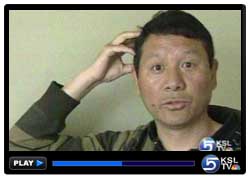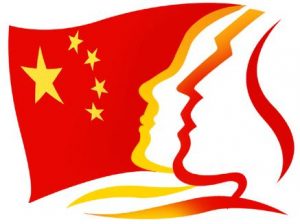It’s 100 days to the 2008 Beijing Olympics! That can only mean one thing! No, not deteriorating reporting conditions. No, not a countdown ceremony in Nepal, though thats some serious unintentional irony right there. No, not whatever else is being reported. No, it can only mean one thing… ROCK!
Month: April 2008
It Ain’t Easy Being Chinese
The idea that the Chinese people, as a whole, are engaged in struggle, overcoming shame, or that every individual is responsible for the fate of the nation goes back before the Communist era. Since 1949, these ideas have been intensified, but it didn’t start there. And now’s a good time to remember it, because the 80th anniversary of the Jinan Incident is coming up next weekend. The Jinan Incident, on May 3rd 1928, was a brutal clash between Chinese and Japanese troops that both sides, it seems, wanted to avoid but failed. Kuomintang forces ended up retreating from the city, and the Kuomintang government declared May 3rd to be National Humiliation Day. A boycott of Japanese goods followed.
Back to Our Motherland
via Hecaitou and Lian Yue, Backtoourmotherland.com.
The website calls for Chinese Canadians to renounce their citizenship and provides links on how to do so. It also argues that the Canadian citizenship pledge is unpatriotic for Chinese since one swears allegiance to the Queen of England, who is the chief representative of Western colonialism, since England took part in the Opium War and humiliated the nation. The website doesn’t appear to give any information as to who has actually done this, or a forum for discussion.
This seems like a really bad idea, considering Yang Hengjun’s brilliant call for media reform in China and increased efforts to reach the true masters of Western media, the audience themselves. Curling into a ball and retreating to China doesn’t seem like it would help with that sort of engagement.
Brainwashing in China, Then and Now
 A word that seems to be cropping quite a bit lately from both Chinese and non-Chinese quarters has been “brainwashing”. The Merriam Webster and American Heritage dictionaries give the etymology xi nao (洗脑), the English word first appearing in 1950.
A word that seems to be cropping quite a bit lately from both Chinese and non-Chinese quarters has been “brainwashing”. The Merriam Webster and American Heritage dictionaries give the etymology xi nao (洗脑), the English word first appearing in 1950.
In the book Thought Reform and the Psychology of Totalism: A Study of “Brainwashing”, Robert Jay Lifton cites the writings of the American journalist Edward Hunter first used it “as a translation of the colloquialism “hsi nao” (literally, “wash brain”), which he quoted from Chinese informants who described its use following the Chinese takeover.” The term was later applied to indoctrination techniques in other parts of the world. Hunter was a propaganda specialist for the OSS during World War II, and collected a great deal of Chinese propaganda material, which is now available in the Chinese Pamphlets e-collection at the Center for Research Libraries. The Oxford English Dictionary says the first appearance of the word was in an article by Hunter for The New Leader in 1950, while Wikipedia cites an article by Hunter in the Miami Daily News the same year titled “‘Brain-Washing’ Tactics Force Chinese into Ranks of Communist Party”.
In the years that followed, “brainwashing” got alot of play to explain defection among American POWs in the Korean War, and that in turn later became part of the premise of “The Manchurian Candidate”.
There doesn’t seem to be any evidence that xinao was an official phrase in the Chinese government, but referred to what is typical translated as “thought reform”, or 思想改造 (sixiang gaizao), which referred to the re-education of the intelligentsia and educated after 1949. Official history says that thought reform started in 1951, but according to one Chinese blogger, the roots can be traced back to 1950 (when Hunter first heard the term xinao referring to political re-education) in Mao Zedong’s speeches at the Second Meeting of the 1st CPPCC National Committee, when he exhorted intellectuals to use their free time to study Marx-Leninism, educate the masses and engage in self-criticism. An English version of the speech, “Be A True Revolutionary”, does not appear to mention intellectuals or holidays, but does quote Mao Zedong saying “Towards the people, on the contrary, it uses the method of democracy and not of compulsion, that is, it must necessarily let them take part in political activity and does not compel them to do this or that but uses the method of democracy to educate and persuade. Such education is self-education for the people, and its basic method is criticism and self-criticism. I hope that this method will be used by all the nationalities, democratic classes, democratic parties, people’s organizations and patriotic democrats in the country.”
The blogger quotes Mao Zedong speaking at the 3rd Plenary of the 7th Central Committee of the CCP, which can also be found on Xinhua, “对知识分子要办各种训练班,办军政大学、革命大学。要使用他们,同时对他们进行改造.” “Intellectuals need to do every kind of training, military education, revolutionary education. They need to be utilized, and at the same time reformed.” Most likely these campaigns, which the following year would solidify as “thought reform”, were the ones Hunter’s informant was referring to when he used the term “brainwash”.
In contemporary China, “xinao” is a bit of a curious word. It is often used precisely as we would use it in the West, right now across the Internet in reference to CNN, or more loosely when author Wang Shuo called the 80s generation brainwashed by Hong Kong and Taiwan pop culture. Numerous stories appear talking about pyramid schemes “brainwashing” people into scams. But then there are the political campaigns mentioned online, such as “City and Rural Party Branches Hand in Hand”, which says that in tackling rural poverty, material donations are not enough but city and rural party members must go to each others areas to “brainwash” and “liberate their thinking”. [突出抓好思想共建。共建不能只是停留在给钱给物的层面上,更要抓好党的建设,解放思想,要组织城市党员进村入户,组织结对村党员进城洗脑,按“一加一模式”结对帮扶贫困党员和贫困户。]
Other instances often use the term brainwash positively (and in quotation marks suggesting its sorta slang) when referring to educating cadres, human resources (no quotation marks), public anti-corruption campaigns and to describe (again, positively) the controversial remarks of Professor Zheng Qiang (郑强), who railed against defects in the Chinese education in a speech in Jiangsu, saying “the higher your test scores, the more disabled you are”, early education overloads students, English education at a university level leads to students who only understands “English with a Sichuan accent”, and other thought provoking stuff.
The term xinao then, seems to have two lives in China. One is the sort of contemporary usage familiar to English speakers, as a negative term for indoctrination and people in China, where the word and concept originated, is now applying it to others, while the other xinao continues to be a term for a kind of “thought reform”, though now applied positively as a buzzword to things like Six Sigma training. Heh. I’ve lost count of the levels of irony at play here.
Photo courtesy of BCostin, under Creative Commons (Flickr)
Guerrilla Broadcasts on the Shanghai Metro
Rumor floating around on the BBSes, copied from the Ming Pao Daily in Hong Kong (google cache):
昨日一个名叫「我爱榨菜君」的网友发表文章称,于昨日上午6时许乘坐地铁2号线,有4名男子在陆家嘴站上车,「穿着黑西装,面容严肃,非常之一本正经,在车上站成了一排」,然后4人各拿出1个录音机,开始播放「我们支持西藏独立」的录音,还「请大家上飞机时记得携带汽油炸药酒精」等。当时车上乘客不多,无人採取任何行动,4人放完录音就跑到另一车厢。
此外有网友称,有朋友停泊在上海音乐学院门前的汽车被喷涂上藏独字样和符号。
Yesterday a netizen called “I Love Mustard King” posted an article, yesterday morning riding the No.2 metro line, 4 men got on at Liujiazui Station [wearing black suits, solemn expressions, unusually serious, entered the car in a row], then the 4 each took out a tape recorder, began to play a [I support Tibetan Independence] recording, as well as [Please Everyone, When Boarding the Aircraft Remember to Bring Gasoline, Explosives, Oil], etc. At the time there weren’t many passengers, no one did anything, the 4 men ran to another car after the recording finished.
Other netizens report friends at Shanghai Music College cars were graffitied with Tibetan independence slogans and symbols.
Either there’s a really imaginative poster out there, or Shanghai is the first victim of Pro-Tibetan Independence performance artists. The article also claims that in the past couple of days Shanghai police have already confiscated more than 100 “volatile materials”. [此外,上海公安开箱检查地铁乘客行李以来,两日已检获百余件易爆物品。] Nail polish remover or C-4?
Scheer Chutzpah?
Lawyer Peter Scheer has a beef with the Great Firewall in the International Herald Tribune, as well as taking a swipe at foreign law firms practicing in China:
At 225 million users and still growing at double-digit rates, China’s Internet is a business opportunity so grand and irresistible that it can blind normally circumspect people to the moral compromises that cooperation with Chinese government authorities inevitably entails.
I experienced this first-hand when, about a year ago, I made inquiries at the China offices of a number of American law firms to ask for help in comparing results for Internet searches performed inside China – within the “Great Firewall” of government censorship, as it is called – with searches performed from outside.
The law firms demurred, explaining, with commendable candor at least, that they could not risk being observed checking out search terms like “Tiananmen Square” or “Falun Gong.” Mind you, these were the kind of lawyers who spend their careers pushing back against the demands of government authorities.
So seductive are the business opportunities in China that the risk of losing them transforms even hardened litigators into wimps.
I guess somebody had their Wheaties that morning. This doesn’t seem fair. Banned keywords are, after all, illegal. It might be stupid, but its the law. While there doesn’t really seem to be any laws against searching for illegal keywords, the keywords themselves are illegal which makes it that risky shade of gray we all know so well in China. There are things that foreign law firms ought to stand up for in China. Doing a search as a favor to a colleague overseas doesn’t seem worth the risk – these are law firms that believe in a process of engagement. Calling them wimps seems unfair, and dismisses that they’re doing good in China in a different way.
Besides, why should they have to recreate what the Berkman Center already did? They get billed by the hour (ba doom ching). Even better, why not use the Blossom tool and do Google searches through a Tor node located in China? (The Tor page appears to be unblocked in China at the moment)
Web sites based outside China, meanwhile, are subject to blocking by the Great Firewall based not on their content, but on their capacity to create, inside China, large, voluntary online communities that are independent of the government. These include nearly all blogging services, Wikipedia and wiki platforms generally, social networking sites and peer-to-peer technologies of all kinds, including photo-sharing and video-sharing businesses. In other words, the full panoply of Internet technologies.
In general, this is true. China’s filters have struck at overseas Web 2.0 applications in particular. But saying its “the full panoply” is inaccurate. China has now unblocked YouTube again and its being bombarded with Chinese made videos about the Tibet controversy. MySpace.cn has 2 million members, which presumably doesn’t include those who signed up on MySpace.com, which has remained unblocked, though it seems to be hanging on a connection today. Facebook.com is unblocked. Chinese users responded to a flickr block with annoyance and proceeded to route past it. Twitter remains unblocked. And nothing has ever seemed to stop BitTorrent, eMule or other peer-to-peer services. I’ll grant Wikipedia is only newly unblocked, and we’ll see how that goes. Blogspot, livejournal, wordpress.com and it seems now blogs.com have been blocked, and the government certainly takes a less than friendly view on them. But Scheer gives the impression these services are totally cut off, while its more patchy and randomly changes.
But here’s the part where Scheer really blows my mind. After saying Western Internet companies in China should disclose their role in censorship (fair), openly assert their disagreement with government policies (problematic), and move Chinese customer data off shore (Rebecca MacKinnon also recommends this) and if they can’t do that at least warn Chinese customers they are adhering to local laws (I believe the terms of service for Yahoo!, MySpace and the like do just that when they mention “damaging public security, revealing state secrets, subverting state power, damaging national unity,” etc.) Good. Fine. But then he goes on to say:
Finally, where warnings are not possible or go unheeded, companies should force customers to give their real names when using their Web sites. That will force users to think carefully about what they say or do online. Ironically, the barring of anonymity is the surest means of getting users to appreciate the risks of saying what the government doesn’t want to hear.
What? How exactly would you “force customers to give their real names”? Obviously you would need something like the real name registration system the government attempted to place on all web content in 2005. Who else but the Chinese government is going to confirm the name is real? Nobody else has anything like that kind of data. You can’t do a credit record check with ChoicePoint or something. Anyway, the system never happened, and later a voluntary “pledge system” was suggested and mocked. And only 15% of the public seemed to like the idea in the first place. This was a government program that free speech advocates such as RSF were against. Yet Scheer is saying that you should go offshore, but if you can’t do that issue a warning, but if you can’t do that – make them all do what the Chinese government once wanted to do and overseas activists feared?
Am I reading this right? Is he actually saying that overseas Internet companies should deny Chinese citizens the right to anonymity so that they’ll get mad and demand rights? Is he really suggesting that Chinese citizens are completely unaware of the consequences of certain speech, and ought to be forced to learn about it by Yahoo! and Google? Is he saying “stick it to them so they’ll learn the hard way”? Because that’s flabbergasting.
Chinese Content Filters Block Air Passages, 1.3 Billion Suffocating
China has expanded its Internet filtering system to the nation’s atmosphere, leaving millions gasping for breath. The new system, called the “Golden Fan Project”, utilizes a complex system of fans, vents and tubes to block any “spiritual pollution” from entering the country.
Nationalist sentiments about Chinese air have been simmering for quite some time, and have recently exploded after recent violence in Tibet. Chinese authorities claim that Tibetans attacked innocent Han Chinese air conditioner salesmen, while Tibetan activists abroad point the finger at China’s occupation of Tibet’s atmosphere and discriminatory breathing policies. The Chinese government has not allowed foreign correspondents to enter Tibet except in specially designed sealed bubbles. “The atmosphere is not good right now, we must take these precautions for the safety of foreign journalists”, said one official.
Tibetan activists counter that the air is fine, but is being exploited by the Chinese. “The air in Tibet is very thin. The growing Han Chinese settler population will soon breath it all up, leaving no Tibetan air for Tibetans,” said Soblang Rimpoche, director of Free Breathing for Tibet. He also points to a massive air pipeline constructed in 2007 to ship air from Tibet into the interior in an effort to support a rapidly developing China’s growing hunger for air.
Meanwhile, the Chinese nationalist web forum Anti-CNN.com has begun a new campaign against “biased foreign air” that “hurts the feelings and the lungs of the Chinese people.” A demonstration outside the offices of Air France last week left 23 dead of auto-asphyxiation, while 44 sustained injuries from holding their breath for too long. An internet manhunt also singled out an overseas Chinese student, who was spotted in photographs breathing European air. “You can clearly see her mouth is open,” said one commenter, “filthy traitor dog!”
Foreign critics of China’s air policies point out that the country has become the world’s number one air polluter, and that China would benefit from paying more attention to its own air rather than others. Chinese supporters believe this is simply a ploy to prevent China developing a more modern climate. They also point to reports that the US Olympic team plans to bring breathing masks and oxygen tents to Beijing, arguing this demonstrates that China’s efforts are no different than any other countries desire to maintain its atmospheric sovereignty.
While it is not clear precisely how the Golden Fan Project works, it seems to involve an array of different methods to block “harmful” foreign air. These methods include blocking breezes from particular regions, filtering for specific scents, and monitoring local air for “inappropriate exhales”. Expatriates in China report that there are numerous ways to breath foreign air, if one uses the appropriate tools, for example the proxy breathing service Anonymouth. “It’s only a minor nuisance,” mumbled blogger Davesgonechina from within his portable Hyperbolic Chamber.
“Foreign air is often very yellow, very violent,” croaked one official at the Ministry of Information Industries wearing a white mask during a Reuters interview, “and is not conducive to a harmonious society. Therefore we are doing our best to protect the Chinese people from its malignant influences.” He then turned blue and collapsed to the floor.
…And the Same Goes For Us
Via Imagethief, Xinjiang scholar James Millward has some PR advice for the PRC. As Imagethief points out, good PR is 90% commonsense, which why I feel that for Professor Millward’s six points for China, there are six corollaries for the rest of the world:
▪ Remember that what you say to a Chinese audience is heard by the world audience
Likewise, remember that what you say in English is often heard by a Chinese audience. I’m looking at you, Jack Cafferty.
▪ Consider how your statements sound in English
I’ve previously written about how Steven Spielberg missed an opportunity to address the Chinese public in Chinese about his concerns when he withdrew as an adviser to the Beijing Olympics Opening Ceremony Committee. Similarly, Twofish has pointed out the language used in the English version of Dalai Lama’s appeal to the Chinese people has alot of conversation stoppers in it. The Chinese version doesn’t, but see Rule #1. If the two contradict one another, you’ll look like a hypocrite.
▪ Don’t employ ancient or strained historical arguments about territorial questions
Here we start to drift away from literal reversals of these rules. Western critics typically do not cite medieval princesses when giving its perspective on Tibet or Xinjiang. There isn’t a Western “5,000 years of separatism” argument. But if you buy the China “dog years” theory, then in the hyperkinetic temporal distortion that is China, a dude in the street in 1989 is ancient history. And we all know that image is burnt into alot of skulls. It’s not in China. So either you’re going to have to go through the enormous effort of convincing these people that something they never heard of happened the way you say it did, or if they have heard of it, they’re gonna say that was sooooo 19 years ago (approximately 163 China years).
▪ Do consider more recent and more realistic historical precedents
In the case of something like the Lhasa incident, it would serve Western critics well to place it in a contemporary Chinese context. For instance, there has been plenty of other riots and demonstrations in China the past few years. Had the emphasis been on this being yet another in a long string of mass incidents, except that it had Tibetan citizens instead of Chinese ones, rather than placing it in the context of independence, a narrative that everyone in the West knows implicitly but in China is not only offensive but completely unknown, perhaps it would’ve found more reception (as opposed to the current 37 Chinese people in Shanghai and Beijing who agree with external perspectives). It also makes more sense; Tibetans in Lhasa face a political environment and injustices closer to those in rural Sichuan than anywhere else in the world, save maybe Xinjiang.
▪ Don’t deny that China has problems; instead, see how they resemble those of other countries
I actually believe the opposite advice applies outside of China – stop thinking China’s communist government parallels the Soviets. Learn some specifics. Stop generalizing based on some shallow surface similarities.
▪ Let reporters report: transparency engenders credibility
On American television and the like, I would suggest focusing more on Chinese voices. How about fewer really pale thinktank analysts and a few more Chinese-American community leaders? How about some more voices from the sea turtle community? Make a bigger effort to have Chinese people representing their own people rather than non-Chinese China Hands.
Avaaz, Mateys! Thar She Blows It!
It seems that the relatively new Avaaz.org has decided to launch an ad campaign for a China-Tibet dialogue. Avaaz bills itself as:
a new global web movement with a simple democratic mission: to close the gap between the world we have, and the world most people everywhere want. [“Avaaz” means “Voice” in many Asian, Middle Eastern and Eastern European languages.] Across the world, most people want stronger protections for the environment, greater respect for human rights, and concerted efforts to end poverty, corruption and war. Yet globalization faces a huge democratic deficit as international decisions are shaped by political elites and unaccountable corporations — not the views and values of the world’s people.
Technology and the internet have allowed citizens to connect and mobilize like never before. The rise of a new model of internet-driven, people-powered politics is changing countries from Australia to the Philippines to the United States. Avaaz takes this model global, connecting people across borders to bring people powered politics to international decision-making.
Precisely which model are they talking about? Well, one of Avaaz’s co-founding organizations is MoveOn.org. MoveOn does not exactly have a reputation of making ads that encourage dialogue between opposing sides, probably most famously for the polarizing “General Petraeus or General Betray Us?” in the New York Times. Avaaz also won an award at the Progressive Source Awards for its video “Stop the Clash of Civilizations!”. I have no idea what the Progressive Source Awards are, but it sounds suspiciously like self-congratulations amongst the like-minded.
Avaaz describes their campaign this way on their front splash page:
After decades of repression, Tibetans are crying out to the world for change. China’s leaders are right now making a crucial choice between escalating repression or dialogue that could determine the future of Tibet, and China.
We can affect this historic choice — China does care about its international reputation. But it will take an avalanche of global people power to get the government’s attention. The Dalai Lama has called for restraint and dialogue: he needs the world’s people to support him. Sign the petition below–It has been delivered at Chinese embassies and consulates worldwide, and will continue to grow and be delivered until talks begin.
and then on the campaign page:
The Beijing Olympics are a crucial chance to persuade China’s leaders to support dialogue and human rights in Tibet, as well as Burma and Darfur.
The Olympics are about humanity and excellence. We want to celebrate them, but we can’t while Tibetans and others suffer. Let’s call on China to save the Olympics for all of us — on billboards and ads in major cities, in Chinese overseas community publications, even through a Chinese language internet team.
Our campaign aims to reach out to China and Chinese people to show that we’re not anti-China but pro-humanitarian, and that our desire is to save the 2008 Olympics, not ruin them.
Click on the link at right to see draft ad concepts, and Donate now!
They have a Chinese language internet team! Hey, that’s something I’ve suggested! Unfortunately, this doesn’t sound like a message that’s going to carry well. Starting off with saying the Tibetans have suffered “decades of repression” (What about the rest of China?), which sounds like an accusation, is not good. Moreover, the premise they’re working on doesn’t seem realistic: “China does care about its international reputation. But it will take an avalanche of global people power to get the government’s attention.” Actually, China cares far more about how its own population feels than “an avalanche of global people power”, and right now people are defensively supporting the government. Protests against China have been a PR bonanza for the CCP.
And it gets worse. Check out their draft ads:
OK, all the ads have the same text. This is the only draft ad with Chinese in it. Presumably their translation team will tackle this text. If they produce a different text in Chinese, Chinese viewers will compare it to the English one and if they have any complaints about the English version, the Chinese version will look deceptive. The text is:
As citizens around the world who believe in the Olympic spirit of humanity and excellence, we want to enjoy the 2008 Olympics in Beijing. We welcome a prosperous and dynamic China into the global community. But with power comes responsibility, and we are concerned that we cannot celebrate the Olympics in good conscience while ignoring the suffering of others. We ask China to Save the Olympics for all of us through three reasonable steps: 1: A meaningful dialogue with the Dalai Lama. 2: Securing the release of Burmese and Tibetan prisoners. 3: Supporting a robust peace mission to Darfur.
OK, Avaaz, I’m gonna give you some free advice on why this isn’t going to fly for Mainland Chinese, or alot of overseas Chinese to boot. Pro-China supporters have made themselves very clear about four things: 1: the Olympics should not be politicized. By saying you can’t “enjoy” the Olympics without certain political concessions, you are ignoring or dismissing what they’ve already told you, not to mention making it sound a bit like “or else!” 2: The Dalai Lama is more persona non grata in China than ever before, and to get a dialogue is going to take alot more than an ad campaign. Your previous effort on Tibet, a petition that garnered 1.6+ million signatures, was received briefly on Anti-CNN with the words “is this a joke?” Meanwhile, 5.6 million people have signed the petition on Sina condemning perceived Western media bias regarding Tibet. If there’s an avalanche of people power in China, does it make a sound? 3: Tibetan prisoners are, in the eyes of the Chinese government and many of its citizens, criminals who are justly imprisoned for committing crimes. 4: Darfur is not China’s fault. Now, there is absolutely a need for a dialogue on these issues. The thing is, your ads are not going to open one. Especially this next one:
“Dear China. You’re Almost There. Don’t Blow It.” That just sounds like a threat. Nice one.
Mutual Respect? It Must Be Some Kind of Trap…

Ceci n’est pas un Lobsang Gendun
Chinese netizens have been furiously seeking the guy who tried to grab the Olympic Torch from Paralympian Jin Jing in Paris. An Internet manhunt was launched and pinpointed a Tibetan man in Utah named Lobsang Gendun. First problem? It’s not the right guy. Utah TV station KSL manages to confuse London with Paris in the article (another example of why Chinese nationalists are taking errors by US media waaaay too seriously), but its definitely not the guy whose name, address, phone number, Google Map location, pet peeves and favorite color have been splashed across Anti-CNN and other Chinese bulletin boards. Oh, and wanted posters.


This isn’t the Tibetan You’re Looking For
His phone began to ring in the middle of the night. At first, they were hang-ups. More calls followed with threatening and obscene messages. Messages left on his answering machine include, “Hey, I wish you to die and go to Hell (obscenity),” and, “Please remember that if you want to be an enemy of the whole Chinese people, then you are doomed, OK?” Continue reading “Mutual Respect? It Must Be Some Kind of Trap…”


